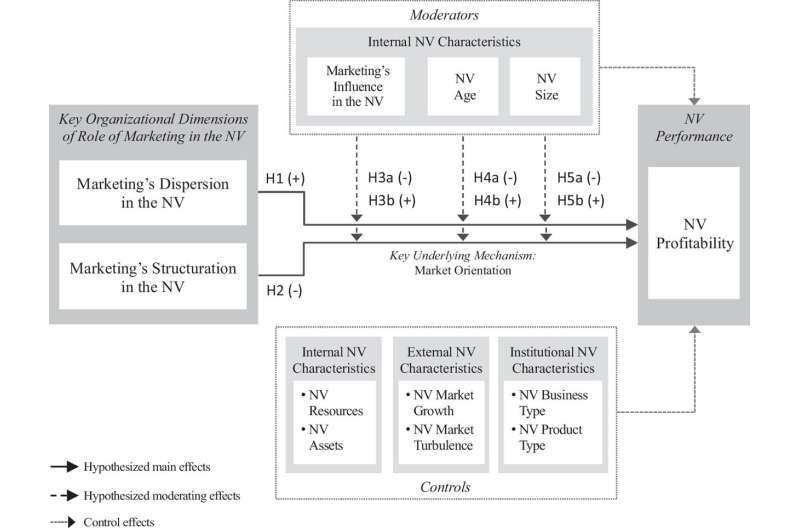This article has been reviewed according to Science X's editorial process and policies. Editors have highlighted the following attributes while ensuring the content's credibility:
fact-checked
peer-reviewed publication
trusted source
proofread
Dispersed marketing responsibility found to enhance the profitability of firms in the early stages of their operations

A recent study found that young firms should disperse marketing responsibility between different personnel groups in the early stages of their operations. These groups often have the ability to produce in-depth market information to support marketing in the early stages of operations. Further, young firms should avoid building too rigid structures in terms of nominating a marketing director or specifying a detailed job description, because this may hinder the flow of information. As operations become established, the importance of a structured and specialized marketing organization in companies will increase.
According to the study, extensive dispersion of marketing responsibility in the early stages of business activities promotes the development of market orientation in firms, while an overly structured organization of marketing responsibilities slows it down.
"Dispersion of responsibility for marketing activities and restraining from building structured positions for marketing helps start-ups to respond to their typical lack of market information," says Professor Mika Gabrielsson from the University of Eastern Finland.
The study, published in the Journal of the Academy of Marketing Science, examined the role of marketing in firms in the early stages of their operations. The researchers interviewed 30 managers from industrial and service sector firms that had been operating for less than ten years. The main method of data collection was a longitudinal survey carried out in two stages: the first survey yielded a sample of more than 200 new ventures and, three years later, it was repeated with almost half of these firms. In addition, the firms' financial statements were used.
Researchers from the University of Eastern Finland, the University of Vaasa, the University of Erlangen-Nürnberg, and the University of Würzburg conducted the study. Research addressing the organization of marketing in new ventures remains limited to date. Entrepreneurship research has mainly focused on the most promising types of marketing activities in young firms, but not the organization of these activities. Marketing research, on the other hand, has examined the organization of marketing activities, but only for established firms, which differ in their opportunities and challenges from firms at an early stage of development.
The current study responds to gaps in previous research, offering managers of early-stage firms practical recommendations for how to design their marketing organization.
"Although marketing activities are vital for young firms to ensure growth and survival, the role of marketing in the organization has not previously been studied for these firms," says Professor Andreas Fürst from the University of Eastern Finland and the University of Erlangen-Nürnberg.
"Our results show how the profitability of start-ups can be improved through the right organization of marketing," explains Professor Peter Gabrielsson from the University of Vaasa.
More information: Andreas Fürst et al, The role of marketing in new ventures: How marketing activities should be organized in firms' infancy, Journal of the Academy of Marketing Science (2023). DOI: 10.1007/s11747-022-00920-4
Journal information: Journal of the Academy of Marketing Science
Provided by University of Eastern Finland



















